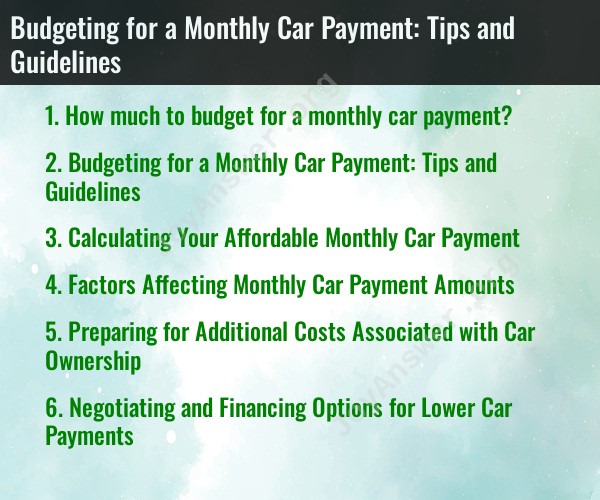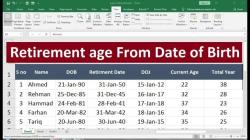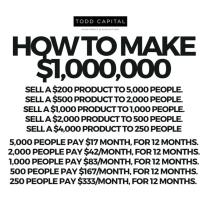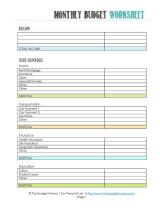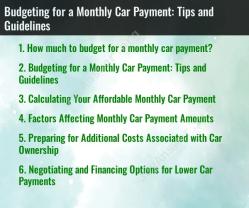How much to budget for a monthly car payment?
The amount to budget for a monthly car payment can vary widely depending on several factors, including your financial situation, the type of car you want, the interest rate, and the length of the loan. Here are some tips and guidelines to help you determine how much to budget for a monthly car payment:
Assess Your Finances:
- Before you decide on a car payment budget, evaluate your overall financial situation. Consider your monthly income, existing expenses, savings goals, and other financial obligations.
Determine a Comfortable Payment Range:
- Financial experts often recommend that your car payment should not exceed 15% of your monthly take-home pay. This is a general guideline, and you can adjust it based on your financial priorities and comfort level.
Consider the Total Cost of Ownership:
- In addition to the monthly payment, factor in other costs associated with car ownership, such as insurance, fuel, maintenance, and registration fees. These expenses can add significantly to your monthly budget.
Set a Down Payment Goal:
- Saving for a down payment can reduce the amount you need to finance and lower your monthly payment. Aim for a down payment of at least 20% of the car's purchase price to avoid paying more in interest.
Check Your Credit Score:
- Your credit score can impact the interest rate you receive on a car loan. A higher credit score may qualify you for a lower interest rate, which can make your monthly payment more affordable.
Shop Around for Loans:
- When financing your car, explore loan options from different lenders, including banks, credit unions, and online lenders. Compare interest rates and terms to find the best deal.
Consider the Loan Term:
- The length of your car loan affects your monthly payment. A longer loan term (e.g., 72 or 84 months) can result in a lower monthly payment but may lead to higher overall interest costs. A shorter loan term (e.g., 36 or 48 months) means higher monthly payments but lower interest costs.
Avoid High-Risk Loans:
- Be cautious of subprime or high-risk auto loans that come with very high interest rates. These loans can lead to unaffordable monthly payments and financial stress.
Factor in Future Changes:
- Consider any potential changes in your financial situation, such as job changes, family additions, or other expenses. Ensure that your car payment budget remains sustainable in the long term.
Plan for a Trade-In or Resale:
- If you plan to trade in or sell your car in the future, consider the potential value you'll receive. This can be used to reduce the overall cost of ownership and the impact on your budget.
Remember that the specific amount you should budget for a car payment will vary based on your unique circumstances and financial goals. Carefully assess your financial situation and use these guidelines as a starting point to determine a car payment budget that is both manageable and aligned with your financial well-being.
Sure, here is a comprehensive explanation of the five topics you mentioned:
Budgeting for a Monthly Car Payment: Tips and Guidelines
A car purchase is a significant financial commitment, and budgeting for the monthly car payment is essential for responsible financial management. Here are some tips and guidelines to consider:
Determine Your Affordability: Before car shopping, assess your overall income and expenses to determine a realistic amount you can comfortably allocate towards a monthly car payment.
Consider the 20/4/10 Rule: A common rule of thumb suggests dedicating no more than 20% of your income to car-related expenses, including the car payment, insurance, fuel, and maintenance. Additionally, aim for a down payment of at least 20% of the car's purchase price to reduce the loan amount and monthly payments.
Factor in Additional Costs: Remember that car ownership comes with additional expenses beyond the monthly payment. Consider insurance premiums, fuel costs, maintenance expenses, and potential parking fees when budgeting.
Plan for Unexpected Expenses: Allocate an emergency fund to cover unexpected car repairs or other unforeseen expenses related to car ownership.
Prioritize Needs over Wants: When choosing a car, prioritize features that meet your essential needs rather than indulging in luxuries that may strain your budget.
Consider Used Cars: Used cars often depreciate significantly, making them more affordable than new cars. You can find reliable and well-maintained used cars at a fraction of the price of new ones.
Calculate Your Break-Even Point: Determine the number of months or years it will take to pay off the car loan entirely to assess the long-term financial commitment.
Calculating Your Affordable Monthly Car Payment
To calculate your affordable monthly car payment, consider these factors:
Your Net Income: Subtract your essential expenses, such as housing, food, utilities, and debt obligations, from your net income to determine your discretionary income.
Debt-to-Income Ratio (DTI): Calculate your DTI by dividing your total monthly debt payments by your gross monthly income. Aim for a DTI of 43% or lower to maintain financial stability.
Loan Term: A longer loan term will result in lower monthly payments but higher overall interest paid. A shorter loan term will have higher monthly payments but lower interest paid.
Interest Rate: The interest rate significantly impacts your monthly payments. A lower interest rate will lead to lower monthly payments and vice versa.
Factors Affecting Monthly Car Payment Amounts
Several factors influence the amount of your monthly car payment:
Car Price: The purchase price of the car is the primary determinant of monthly payments. A more expensive car will generally result in higher monthly payments.
Down Payment: A larger down payment reduces the amount financed, lowering the loan amount and consequently the monthly payments.
Loan Term: The length of the loan, typically expressed in months, affects the monthly payment amount. Shorter loan terms generally result in higher monthly payments but lower overall interest paid.
Interest Rate: The interest rate is the percentage of the loan amount that borrowers pay as a fee for borrowing money. A higher interest rate leads to higher monthly payments.
Sales Tax and Registration Fees: These additional costs are factored into the loan amount and can increase the monthly payment.
Preparing for Additional Costs Associated with Car Ownership
Beyond the monthly car payment, car ownership involves various additional costs that should be considered when budgeting:
Car Insurance: Car insurance is mandatory and can vary significantly based on factors like age, driving experience, car type, and location.
Fuel Costs: Fuel expenses depend on fuel prices, fuel efficiency of the car, and driving habits.
Maintenance Costs: Regular maintenance is crucial for maintaining the car's condition and preventing costly repairs.
Parking Fees: Parking fees can be a significant expense, especially in urban areas with limited parking availability.
Depreciation: Cars depreciate in value over time, which means the car's worth will decrease as you own it.
Negotiating and Financing Options for Lower Car Payments
Negotiation and financing options can play a role in securing lower car payments:
Negotiating the Car Price: Research fair market value and negotiate with the dealer to lower the purchase price, reducing the loan amount and monthly payments.
Exploring Financing Options: Compare interest rates from different lenders to find the best financing options with the lowest interest rate, which can significantly reduce the overall cost of the loan.
Consider Refinancing: If interest rates decline after you purchase the car, refinancing the loan at a lower rate can lower your monthly payments and save on interest.
Extended Warranties: Extended warranties can provide peace of mind but can also be costly. Carefully evaluate the benefits and costs before purchasing an extended warranty.
Remember
